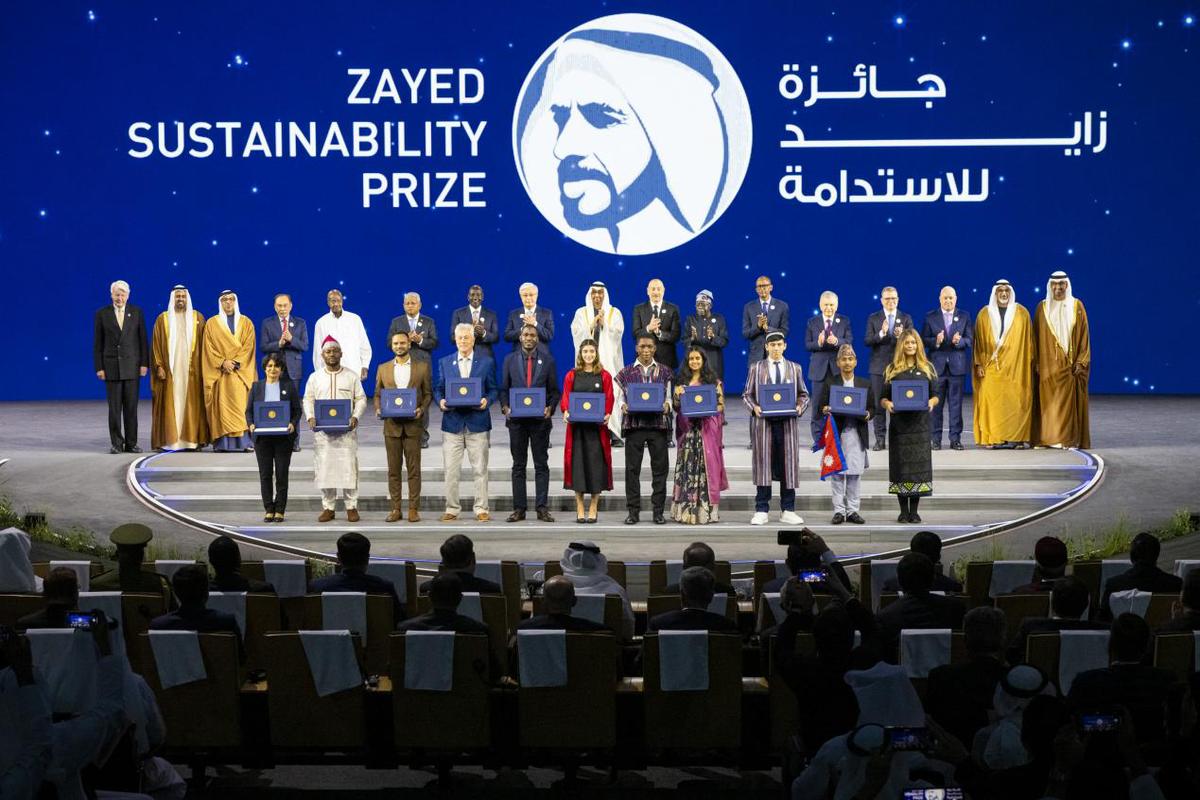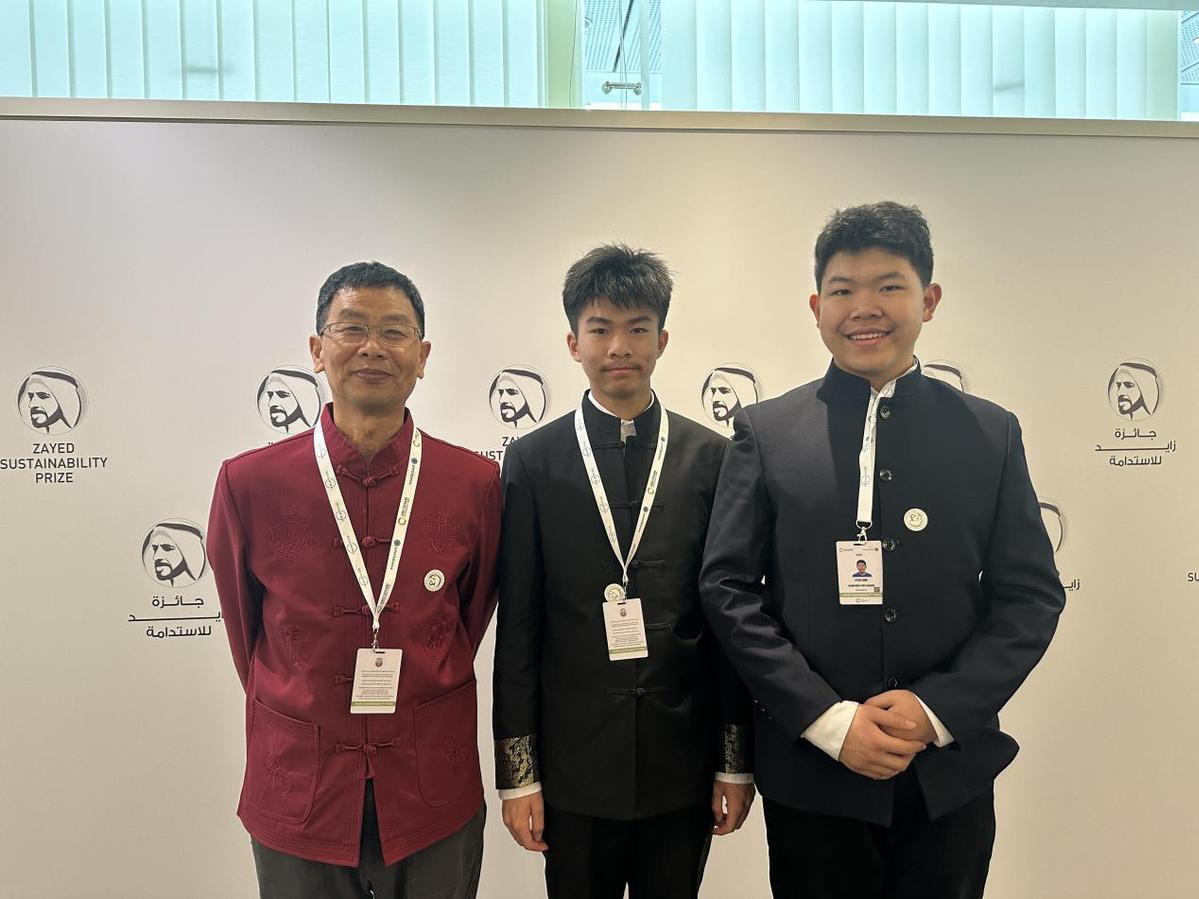
UAE's President Sheikh Mohamed bin Zayed Al Nahyan meets with the winners in Abu Dhabi on Tuesday. PROVIDED TO CHINA DAILY
Eleven pioneering organizations and high schools worldwide were awarded the 2025 winners of the Zayed Sustainability Prize on Tuesday in Abu Dhabi, the capital of the United Arab Emirates, in a global effort to foster solutions to common challenges.
In a ceremony held at the Abu Dhabi National Exhibition Centre and attended by 11 heads of state, ministers and business leaders, UAE's President Sheikh Mohamed bin Zayed Al Nahyan presented the awards to the winners covering six categories of health, food, energy, water, climate action and global high schools.
The prize, the president said, inspires solutions that address critical social and environmental challenges. By nurturing these efforts, the UAE is not only creating a more sustainable future for all but also honoring the legacy of the late president Sheikh Zayed bin Sultan Al Nahyan, the founder of UAE whose vision continues to inspire, he added.
In a keynote speech, Dr Sultan Ahmed Al Jaber, UAE minister of industry and advanced technology and director-general of the prize, lauded the work to deliver innovative solutions that address the world's most pressing challenges.
"This year's winners showcase solutions that leverage advanced technologies, including AI, enhance local resilience, and deliver transformative, scalable impact worldwide. In doing so, they embody the power of progress in accelerating sustainable development and inclusive socio-economic growth," he said.
Since 2008, the prize has helped the lives of 384 million people worldwide through the innovative solutions presented by its 117 winners.
In the health, food, energy, and water categories, each winner receives $1 million, while the global high school's category has six winners, representing six world regions, with each winner receiving up to $150,000.
This year, in the health category, India's Periwinkle Technologies was awarded the prize for its portable, AI-enabled cervical cancer screening device. It provides results at the point of care within 30 seconds, benefiting over 300,000 women across India.
In the food category, Nigeria's NaFarm Foods won for its hybrid solar food dryers that prevent post-harvest losses, reducing both food wastage and carbon consumption.
In the energy category, Palki Motors, a startup from Bangladesh, was awarded the prize for its locally manufactured, affordable, and lightweight electric vehicles. Priced at $4,990, these vehicles cater to the unique transportation needs of the region.

Xiong Zitian (right) and Zhang Yuran (center), both 15, represent the Beijing World Youth Academy, a finalist under the global high schools group, in Abu Dhabi on Tuesday. Cui Haipei/CHINA DAILY
In the water category, SkyJuice Foundation, an Australian non-profit organization, won for its low-cost, gravity-powered water treatment solution, which uses low-pressure membrane filters to provide clean drinking water. Over three million people from 74 countries have benefited from their 9,000 installations.
In the climate action category, OpenMap Development Tanzania won for its mapping solutions, which merge community-driven data collection with advanced technologies such as drones, geographic information systems, and remote sensing. To date, it has benefited 140,000 people, creating 100 jobs.
The 2025 recipients of the global high schools awards are Centro de Estudios Tecnologicos del Mar No 07 from Mexico, Sakafia Islamic Senior High School from Ghana, Merryland International School from UAE; Presidential School in Tashkent from Uzbekistan, Janamaitri Multiple Campus from Nepal and Te Pa o Rakaihautu from New Zealand.
Chinese finalists
The award has seen 33 finalists selected for 2025, including two entries from China, after receiving almost 6,000 submissions.
Xinjiang Shawan Oasis Sustainable Development Institute, a nonprofit that specializes in solar-powered smart greenhouses that transform desert land into farms, is under the food category.
The desert greenhouse solution has been successful in providing vegetable and fruit supplies in desert areas, said Chen gang, executive director of the nonprofit.
More than 30 kinds of vegetables have been planted in such greenhouses, including eggplant, tomato, pepper, cucumber, potato, leaf lettuce and watermelon.
A greenhouse with an area of 600 square meters can produce nearly 7,000 kilograms of eggplant annually. Based on the average vegetable consumption of 0.5 kilograms for an adult per day, the output of a greenhouse can meet the need for sufficient vegetable supplies for 38 adults, he said.
The Beijing World Youth Academy, a private school, is a finalist in the global high school's group, which offers student-led sustainability solutions.
Xiong Zitian and Zhang Yuran, both 15, have led a group of 30 students to recycle food and organic waste through composting, and cultivating plants for the school community.
"By doing the program, we learn scientific research methods through experiments and tests of soil fertility, which will help us in the future," said Zhang.
"Although we are a little bit upset in not winning, it is a rare experience. As a member of China's Gen Z, we met many peers around the world with broad vision and operational ability. By communicating, we will expand the program and benefit a wider community," said Xiong.
cuihaipei@chinadaily.com.cn